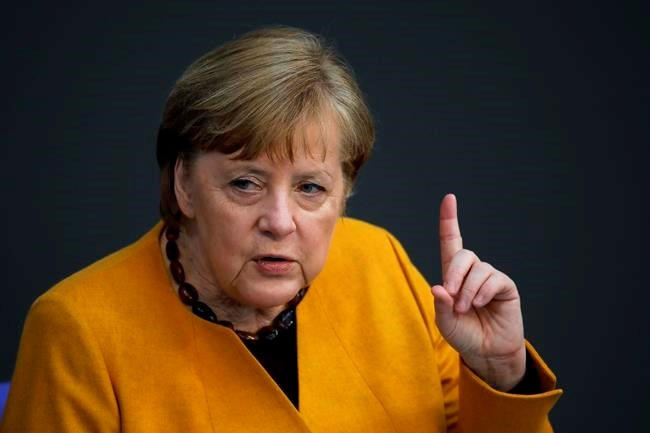BERLIN — German Chancellor Angela Merkel has blamed her country's difficulties during the coronavirus pandemic — from the slow vaccine rollout to the back-and-forth over lockdown rules — partly on “a tendency toward perfectionism” and called for greater flexibility to tackle the latest surge in cases.
In an hour-long television interview with public broadcaster ARD late Sunday, Merkel acknowledged that mistakes were made by her government, including on plans for an Easter lockdown, which had to be reversed.
The long-time leader also expressed frustration over the actions of some of Germany's state governors, including members of her own party, who have resisted tougher restrictions they had previously agreed to.
But Merkel, who isn't running again in September's national election, said she stands by her pledge to offer every adult a vaccine by the end of the summer, and insisted Germany still compares well with most of its
“Perhaps we're very perfectionist at times and want to do everything right, because obviously whoever makes a mistake always faces quite a lot of public criticism,” Merkel said.
“But there needs to be flexibility, too,” she added. “That, I believe, is an attribute that we as Germans perhaps need to learn a little bit more, alongside our tendency toward perfectionism.”
As an example, she cited the need for doctors and vaccine
Merkel said she expects a significant increase in supply and the start of vaccinations in general practitioner offices next month to boost the vaccine program going forward.
With recent opinion polls showing falling support for her government and party, Merkel urged Germans not to become overwhelmed by despair.
“We have a difficult situation," she said. “But look at our
“We also need to voice a bit of courage and strength," she said.
Germany’s disease control agency on Monday reported 9,872 newly confirmed infections in the past day, and 43 deaths.
Since the start of the outbreak, the country of 83 million has recorded almost 2.8 million confirmed COVID-19 infections and 75,913 deaths, significantly fewer per population than France, Britain or the United States.
Asked about Britain's decision to relax some restrictions Monday amid a sharp drop in infections, Merkel's spokesman insisted that “it's not a race.”
“A look towards Britain shows light and shadow, and we're happy about the light,” Steffen Seibert told reporters in Berlin. “And we grieve with Britain for the many, many dead they have already had to lament during this pandemic.”
In her televised interview, Merkel also took aim at some state governors who have refused to trigger the so-called emergency brake they had agreed to put in place earlier this month, when weekly infection rates rise above 100 per 100,000 inhabitants.
“We need to implement the necessary measures now with great seriousness," she said. "Some states are doing that, others aren’t doing that yet.”
Merkel called out three states in particular — tiny Saarland on the border with France, the capital Berlin and North Rhine-Westphalia, which is run by her would-be successor Armin Laschet — for failing to adhere to either the spirit or the letter of the rules she and the governors had agreed.
Possible additional measures include curfews, Merkel said, and she indicated that she might seek legislative backing from parliament if the states aren't willing to enforce existing rules.
Markus Soeder, the governor of Bavaria and another hopeful to succeed Merkel in the Sept. 26 election, voiced support for stronger nationwide rules.
“If the chancellor were to take the initiative at the national level to change the law and set clear guidelines, she would have my support,” he told ARD television.
Laschet, his rival to lead the chancellor's
"The bureaucracy that we apply in Germany is a constraint, especially when it comes to vaccination, where we're not making progress fast enough,” he said.
___
Kirsten Grieshaber contributed to this report.
___
Follow AP’s pandemic coverage at:
https://apnews.com/hub/coronavirus-pandemic
https://apnews.com/hub/coronavirus-vaccine
https://apnews.com/UnderstandingtheOutbreak
Frank Jordans, The Associated Press




